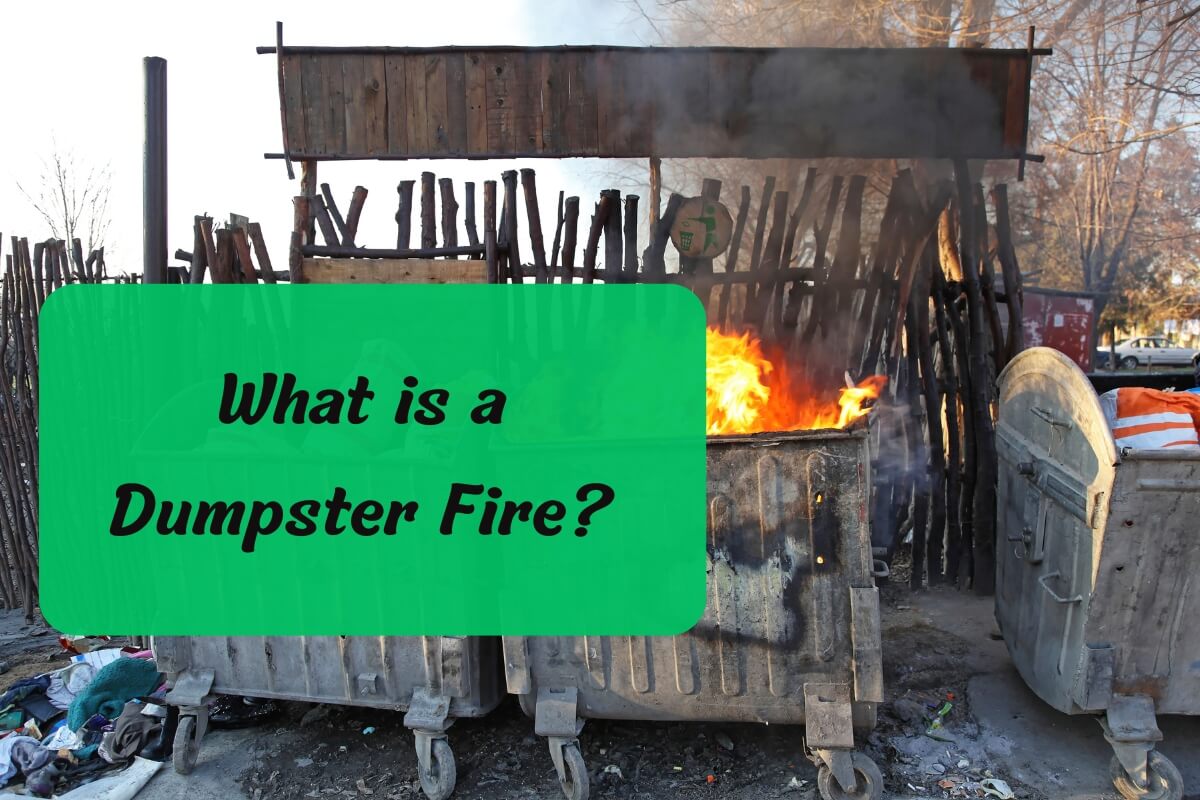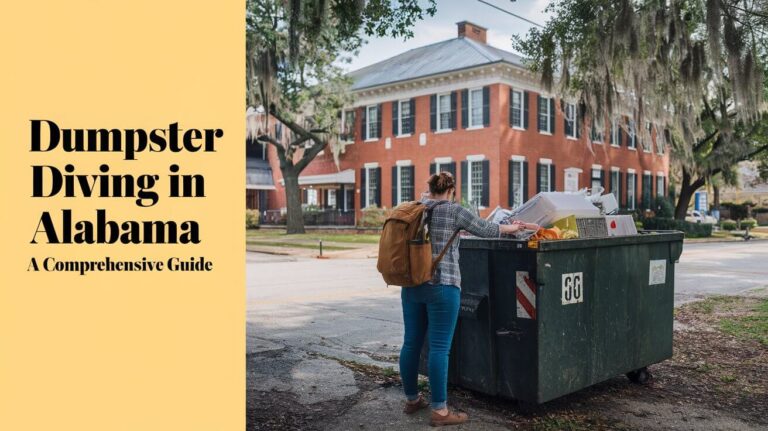
The phrase “dumpster fire” has become a popular way to describe situations that are complete disasters. But where did this phrase come from, and how did it become so widely used in politics, sports, and pop culture? Let’s take a closer look at the origins and meaning of “dumpster fire” and explore how it’s used to describe chaotic and mismanaged situations.
The Literal Roots: Fires in Trash Bins
To understand the metaphorical usage of “dumpster fire,” we must first examine its literal meaning. A dumpster, also known as a trash bin or garbage container, is a large receptacle used for disposing of waste materials. In certain circumstances, the contents of a dumpster can ignite, leading to an actual fire within the bin.
These literal dumpster fires can occur due to various reasons, such as the improper disposal of flammable materials like paper, cardboard, or chemicals. When these combustible items come into contact with a heat source or a spark, they can quickly catch fire, resulting in a blaze that can be challenging to extinguish due to the confined space and the abundance of fuel.
The Emergence of the Metaphorical Meaning
While the term “dumpster fire” has been used to describe literal fires in trash bins for decades, its metaphorical usage is a more recent phenomenon. The earliest known example of this figurative sense dates back to 2003, when a film critic likened a poorly remade horror movie to “the cinematic equivalent of a dumpster fire – stinky but insignificant.”
From there, the term gradually gained traction, particularly in the world of sports, where underperforming teams or athletes were labeled as “dumpster fires” by fans, commentators, and journalists. By 2010, the phrase had gained widespread popularity, becoming a common way to describe situations that were absolute disasters, messes, or colossal failures.
The Rise of “Dumpster Fire” as a Cultural Phenomenon
The metaphorical usage of “dumpster fire” reached its peak during the 2016 United States presidential election. The intense political climate, scandals, and perceived mismanagement of the campaigns led many to describe the election itself as a “dumpster fire.” The term’s popularity skyrocketed, with its usage spiking on social media, news outlets, and everyday conversations.
In recognition of its cultural impact, the American Dialect Society declared “dumpster fire” as the “Word of the Year” for 2016, beating out contenders like “woke” and “normalize.” This accolade solidified the term’s place in the lexicon, cementing its status as a vivid and evocative descriptor for chaotic situations.
What Does “Dumpster Fire” Mean?
At its core, the term “dumpster fire” is a metaphorical expression used to describe a situation that is completely disastrous, out of control, and seemingly beyond repair. It conjures up images of a raging fire within a dumpster, with flames and smoke billowing from the confined space, representing chaos and destruction.
When applied metaphorically, “dumpster fire” is often used to convey a sense of extreme incompetence, mismanagement, or negligence that has led to a situation spiraling out of control. It implies that the situation is a complete mess, with little hope of resolution or improvement without significant intervention or overhaul.
Examples of contexts where “dumpster fire” might be used include:
- A sports team going through a prolonged losing streak, plagued by poor performance, injuries, and internal conflicts.
- A political scandal or controversy that has escalated to the point of becoming a public relations nightmare.
- A movie, TV show, or other entertainment project that has received overwhelmingly negative reviews and criticism from audiences and critics alike.
- A business or organization that is plagued by financial troubles, mismanagement, and a lack of direction or leadership.
In essence, describing something as a “dumpster fire” is a way of conveying that it is an utter disaster, a situation that has become so chaotic and out of control that it resembles a raging fire in a confined space, with little hope of containment or resolution without significant intervention.
Dumpster Fires in Sports
The world of sports has been a fertile ground for the use of the “dumpster fire” metaphor. Teams or athletes that are underperforming, plagued by controversies, or experiencing prolonged periods of failure are often labeled as “dumpster fires” by fans, commentators, and the media.
For example, during the 2022 NFL season, the Carolina Panthers were described as a “dumpster fire” after a string of losses, coaching changes, and internal turmoil. Similarly, the Los Angeles Lakers were deemed a “dumpster fire” in 2022 due to their disappointing performance, injury woes, and reported locker room tensions.
The metaphor is particularly apt in sports, where the intensity and emotions surrounding a team’s or athlete’s performance can be likened to a raging fire, with every setback or controversy adding fuel to the flames.
Dumpster Fires in Politics and Current Events
The realm of politics and current events has been a prime breeding ground for “dumpster fire” metaphors, particularly in recent years. Political scandals, controversies, and perceived mismanagement of situations have often been described as “dumpster fires” by pundits, journalists, and the general public.
One notable example is the 2016 United States presidential election, which was widely referred to as a “dumpster fire” due to the intense political climate, divisive rhetoric, and various controversies surrounding the campaigns of both major candidates.
Other examples include the ongoing COVID-19 pandemic and its handling by various governments, which has been labeled a “dumpster fire” by critics who perceive the response as chaotic and mismanaged. Similarly, events like the January 6th insurrection at the United States Capitol have been described as “dumpster fires” due to their chaotic and destructive nature.
In politics and current events, the “dumpster fire” metaphor serves as a powerful way to convey the sense of chaos, mismanagement, and utter disaster surrounding specific situations or events.
Dumpster Fires in Pop Culture and Entertainment
The entertainment industry is no stranger to the “dumpster fire” metaphor, as it is often used to describe movies, TV shows, or celebrity incidents that have garnered overwhelmingly negative attention or criticism.
For instance, the 2017 film “The Emoji Movie” was widely panned by critics and audiences alike, with many labeling it a “dumpster fire” of a movie due to its poor execution, cringeworthy humor, and perceived lack of substance.
In the world of television, shows that have been labeled as “dumpster fires” include the final season of “Game of Thrones,” which received backlash from fans for its perceived rushed and unsatisfactory conclusion, and the short-lived “Murica” series, which was widely criticized for its offensive and insensitive portrayal of stereotypes.
Celebrity scandals and public incidents can also be described as “dumpster fires,” such as the infamous “Framing Britney Spears” documentary, which shed light on the media’s treatment of the pop star and the conservatorship battle that ensued.
In the realm of pop culture and entertainment, the “dumpster fire” metaphor is often used to convey a sense of disappointment, criticism, and perceived failure surrounding a particular project or event.
The Anatomy of a Dumpster Fire Metaphor
To truly appreciate the power and vivid imagery of the “dumpster fire” metaphor, it’s important to dissect its individual components and understand how they contribute to the overall meaning.
- The Dumpster: A dumpster, or trash bin, is a container designed to hold garbage and waste materials. In the context of the metaphor, the dumpster represents the initial situation or subject being described. It is the vessel that contains the metaphorical “mess” or “garbage” – the problems, issues, or controversies that have led to the disastrous state of affairs.
- The Fire: Fire is a powerful and destructive force that represents chaos, uncontrollable circumstances, and the escalation of a situation from bad to worse. In the context of the metaphor, the fire symbolizes the spiraling out of control nature of the situation, with each new development or controversy adding fuel to the flames and exacerbating the disaster.
- The Confined Space: A dumpster fire occurs within the confined space of the trash bin, creating a scenario where the fire is contained but also intensified due to the limited oxygen supply and the abundance of combustible materials. This aspect of the metaphor suggests that the disastrous situation is self-contained, with the issues and problems often exacerbating each other within a limited scope or environment, making it harder to control or extinguish the metaphorical blaze.
The combination of these elements – the dumpster as the initial container of problems, the fire as the escalating chaos, and the confined space as the self-perpetuating cycle of issues – creates a vivid and powerful metaphor that effectively captures the essence of a situation that has spiraled out of control and become an utter disaster.
The Linguistic Appeal of “Dumpster Fire”
Beyond its descriptive power, the term “dumpster fire” has endured in popular culture due to its linguistic appeal and memorability. Several factors contribute to its staying power:
- Vivid Imagery: The phrase conjures up striking visual imagery of an actual dumpster engulfed in flames, making it easy for the mind to grasp the metaphorical meaning.
- Humor and Hyperbole: There is an element of humor and exaggeration in describing a situation as a “dumpster fire,” which adds to its appeal and makes it a more enjoyable term to use in casual conversation.
- Plosive Sounds: The phrase contains several plosive sounds (the “d” and “t” sounds), which can contribute to its perceived funniness or memorability, similar to the made-up words of Dr. Seuss.
- Evocative Language: The term “dumpster fire” is evocative and memorable, painting a vivid picture in the listener’s or reader’s mind, making it a more effective descriptor than more conventional alternatives.
This combination of vivid imagery, humor, and linguistic appeal has helped cement “dumpster fire” as a popular and enduring metaphor in the English language.
Alternatives and Variations of “Dumpster Fire”
While “dumpster fire” has become a go-to metaphor for describing disastrous situations, it is not the only expression used for this purpose. Here are some alternative phrases and variations that convey similar meanings:
- Trainwreck: Often used to describe situations that are unfolding disastrously and in a chaotic manner, much like a train derailing from its tracks.
- Sh*tshow: A more vulgar term that conveys a sense of complete chaos and disorganization.
- Clusterfk**: Another profane expression that suggests a situation is an utter mess or disaster.
- Dumpster inferno: A variation on “dumpster fire” that emphasizes the intensity and destructive nature of the metaphorical blaze.
- Trash fire: A more literal variation that focuses on the burning of trash or garbage as the metaphor.
These alternatives and variations offer different shades of meaning and intensity, allowing speakers and writers to convey the degree of disaster or chaos they wish to express.
Conclusion
The term “dumpster fire” has firmly established itself as a vivid and evocative metaphor for describing situations that are utterly disastrous, chaotic, or mismanaged. From its humble beginnings as a literal description of fires in trash bins, the phrase has evolved into a cultural phenomenon, permeating various realms such as sports, politics, pop culture, and everyday conversation.
Its staying power can be attributed to its striking imagery, humorous undertones, and linguistic appeal, making it a memorable and effective way to convey the sense of a situation spiraling out of control. Whether it’s a struggling sports team, a political scandal, or a poorly received entertainment project, the “dumpster fire” metaphor effectively captures the essence of chaos, mismanagement, and utter disaster.
As language continues to evolve, it’s likely that “dumpster fire” will remain a part of the lexicon, serving as a vivid and relatable way to describe the calamitous situations that inevitably arise in various aspects of life. So, the next time you encounter a situation that seems to be an utter mess, don’t hesitate to employ this colorful metaphor to aptly convey the extent of the disaster.






